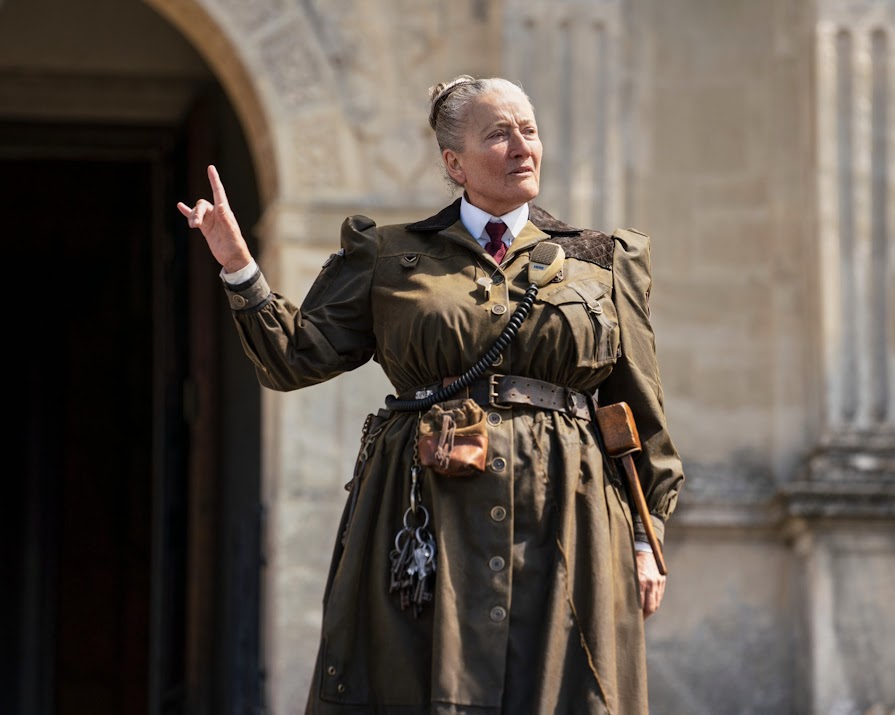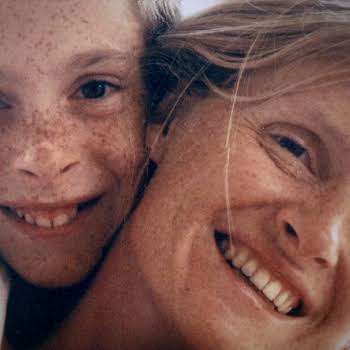Gaining weight for a part is good but wearing a ‘fat suit’ is bad? Unpacking the Emma Thompson backlash
By Sarah Finnan
02nd Jul 2022
02nd Jul 2022
Prosthetics are ok but fat suits aren't: the latest controversy surrounding Emma Thompson wearing a body prosthetic in the upcoming 'Matilda' remake begs the question of where exactly Hollywood draws the line on such matters.
Just a few short months after Sarah Paulson faced backlash for her portrayal of Linda Tripp in Ryan Murphy’s American Crime Story, Reneé Zellweger found herself at the centre of a similar scandal… more recently, Emma Thompson has come under similar scrutiny.
Set to star as the evil Miss Trunchbull in an upcoming musical remake of the beloved movie Matilda, the just-released trailer for the flick has already caused considerable controversy – largely because Thompson can be seen donning a “fat suit” throughout.
“I can’t believe someone would agree to put a thin person into this costume,” one onlooker wrote on Twitter. “The original [movie] was already fat phobic enough, but now they put Emma Thompson into a fat suit.”
Another described the decision as “really disappointing” and “so gross”.
Oh Emma…
Then she pops on a fat suit for her role in Matilda & undermines all the excellent messages she gives here. It's such a disconnect!
I love Emma Thompson but I'm not sure she realises that by demonising fat women, she's part of the problem. @sezl & I have thoughts. https://t.co/cYhymNabUP— Sarah Simons (@MsSarahSimons) June 20, 2022
the new matilda adaptation looks fun but did we have to put emma thompson in a fat suit with facial prosthetics…… I'm sure there are thousands of talented actresses that could play ms trunchbull who actually fit the role's body type.
— tyrannosaurus lex (@folkmare) June 18, 2022
I can't believe someone would agree to put a thin person into this costume for Matilda the musical. The original was already fat phobic enough but now they put Emma Thompson into a fat suit. pic.twitter.com/TQRo7GrWoo
— Amanda Levitt (@FatBodyPolitics) June 17, 2022
Criticised by many as “fat phobic” and a lazy approach to authentic casting, it’s a conversation that has been had many times before. In fact, it was mere months ago that Renée Zellweger found herself the unwilling victim of the internet’s wrath.
Cast as the lead in the recently-released true crime series The Thing About Pam, Zellweger plays Pam Hupp, a convicted murderer currently serving a life sentence for killing both Louis Gumpenberger, a disabled man, and her best friend, Betsy Faria.
The crime
Based on the eponymous Dateline NBC podcast about the murder, the story details how, two days after Christmas 2011, Russ Faria arrived home to find his wife, Betsy, dead. According to NBC, Betsy’s brutal murder “set off a chain of events” that would subsequently leave another person dead and expose a diabolical scheme orchestrated by Ms Hupp.
Russ became the prime suspect in the case, with suspicions only fuelled by Pam who told police officials how “scared” Betsy was of her husband. Only seeing a few stab wounds at first, Russ feared that Betsy had acted on suicidal ideations she had expressed as a result of her terminal stage four breast cancer diagnosis, however, an autopsy revealed that she had actually been stabbed more than 50 times and the case was immediately ruled a murder. Russ was convicted of killing his wife and served more than three years in prison before an appeal set him free and a retrial declared him not guilty in 2015.
A murder charge was then filed against Pam, who Russ and his defence attorney suspected early on, and it was revealed that not only was she the last person to have seen her best friend alive, but she was also, conveniently, the beneficiary on one of Betsy’s life insurance policies. Prosecutor Mike Wood commented that he couldn’t “pick a case more depraved than [this one]”, noting that Hupp not only murdered her friend, but mutilated the body, staged the scene and testified against an innocent man… all for the $150,000 she would gain as beneficiary of Betsy’s life insurance policy.

Five years later in August 2016, Hupp shot and killed a man she claimed had accosted her in the driveway of her home, demanding “Russ’s money” and threatening to kill her. Investigators determined that the man, Louis Gumpenberger, was not an intruder but an unwitting participant in a scheme Hupp had devised to frame Russ Faria and portray him as a violent person.
According to investigators, Hupp had approached Gumpenberger, who had a brain injury, posing as a Dateline producer and led him into her car with a “bogus promise of money to re-enact a 911 call for an upcoming episode”, something Dateline would never do.
A week after the incident, Hupp was charged with Gumpenberger’s murder and sentenced to life in prison. That case prompted Mike Wood to reopen Betsy Faria’s murder case, which eventually led to her being charged with first-degree murder in that case too – over 10 years after Betsy had been found dead.
The controversy
As if the story itself wasn’t controversial enough, the six-part docudrama also came under criticism for its casting of Zellweger as the lead. Why? Because, like Thompson in Matilda, Zellweger can be seen wearing a body prosthetic – or “fat suit” – throughout the series.
Speaking to Entertainment Tonight about the transformation, the actress said that it essentially came down to wanting to be as accurate in their portrayal of the story as possible. “The idea is to be accurate, the idea is accuracy,” she said. “I think, especially in the case of telling this story, it was really important to as closely resemble Pam Hupp as we possibly could, because she seems so familiar, she seems like someone that we recognise and we know.”
“In order for you to better understand how possible it might be that people would project onto her who they are sure that she might be or what kind of person she might [be], it just seemed really important that we got as close to that as we could,” she continued.
According to Zellweger, Arian, the series’ prosthetic expert, built everything they used for her character by hand. “He creates them by hand and paints them down to the last freckle. His precision is remarkable,” she added before saying that the hours she spent in the makeup chair were “part of the adventure” in becoming Pam Hupp.
I see they've made a film about Pam Hupp starring Renee Zellweger in a fat suit.
It's a real shame that there are zero overweight actresses in the world, isn't it.
— The Emmageddon (@The_Emmageddon) February 24, 2022
I just saw Renee Zellweger in a fat suit for a new show and sighed for 6 days.
It's like this gets discussed every time it happens but it also keeps happening every time.
— Mare of Elm Street (@Jules_McCloud) February 3, 2022
The public was less than impressed by it all though, denouncing the series for relying on prosthetics and not prioritising representation by casting a fat actor to play the role instead. “Are there not normal and full figure actors out there?”, one person questioned. “Whenever we see the fat suit pulled out – can’t help but think they are playing for cheap [laughs],” they continued. “It is 2022, let’s stop with thin actors in fat suits,” another agreed.
The same story
Last year actress Sarah Paulson faced similar backlash when she was cast as Linda Tripp in American Crime Story. Honing in on the Clinton-Lewinsky scandal – one of the most infamous improprieties of the late 1990s – there was plenty of renewed interest in the story as a result of the programme, but while most eyes were focused on the series lead, Beanie Feldstein, (who played Monica Lewinsky herself), it was Paulson that actually found herself in the bad books.
Stepping up to the plate as Ms Tripp, a civil servant who secretly recorded phone calls between Clinton and Lewinsky at the time, Paulson’s character was a key component in The Starr Report that led to the then president’s impeachment. As is often the case with movies/shows based on real people though, Sarah Paulson looks vastly different to Linda Tripp and so, like Zellweger, had to undergo a dramatic physical transformation for the role.
Morphing into the character by way of a blonde wig, a prosthetic nose and false teeth, Paulson also gained 30 pounds for the role – completing the look courtesy of 4.5 pounds of additional padding. The decision to wear a “fat suit” did not sit well with some viewers though, many of whom pointed to Hollywood’s long history of fatphobia as the reason behind their anger.
Later addressing the backlash in a subsequent interview with The Los Angeles Times, the Ocean’s Eight star said, “It’s very hard for me to talk about this without feeling like I’m making excuses. There’s a lot of controversy around actors and fat suits, and I think that controversy is a legitimate one. I think fatphobia is real. I think to pretend otherwise causes further harm.”
https://twitter.com/emily_glenister/status/1426211984828162048
Acknowledging that the controversy is warranted in one breath, but trying to rid herself of blame in the next, Paulson admitted that she doesn’t think the onus lies completely with the actor in such a situation. “That entire responsibility, I don’t think, falls on the actor for choosing to do something that is arguably – and I’m talking about from the inside out – the challenge of a lifetime. I do think to imagine that the only thing any actor called upon to play this part would have to offer is their physical self is a real reduction of the offering the actor has to make. I would like to believe that there is something in my being that makes me right to play this part.
“Was I supposed to say no [to the part]? This is the question,” she pondered. Noting her own privilege in being able to reflect on the experience after having “already gotten to do it and having had an opportunity that someone else didn’t have”, she finished by saying, “Should I have known? Abso-f*cking-lutely. But I do now. And I wouldn’t make the same choice going forward.”
Her comments seem to have had the opposite effect than intended though, and much of the public has only been further agitated by her sort of blasé response. Hiring a fat actor to play the role would have been the obvious solution – it’s “the challenge of a lifetime”, by Paulson’s own description so no doubt there would have been a queue of hopefuls more than happy to step up to the plate.
The method
Let’s stick with Paulson as Tripp for a minute though. As previously mentioned, she already put on 30 pounds for the role… what if she had gained just 4.5 pounds more and no additional padding was needed, would there have been such a backlash to her casting in that case? Actors are often lauded for the extreme efforts they go to for their art but unhealthy habits are fostered in the name of authenticity. Strict filming schedules mean that celebrities employ dangerous tactics to speed the transformation process up, with that then feeding into diet culture and the toxic ideology surrounding how men and women are “supposed” to look.
Christian Bale lost 63 pounds in four months for his role in The Machinist. Matthew McConaughey shed 50 pounds for Dallas Buyers Club – eating fish, tapioca pudding and “as much wine” as he wanted to drink. Beyoncé dropped 20 pounds on a juice cleanse for Dreamgirls. Even Reneé Zellweger has previously done “the method thing” and put on 30 pounds to play Bridget Jones.
https://twitter.com/Cxllxm02/status/1497975055644512260
The list goes on. It’s notable too that Christian Bale and Matthew McConaughey’s transformations continue to be lauded as some of the “best” of all time. Beyoncé was praised for her new physique and too much was said of Zellweger’s weight. It’s always about the appearance of the actor’s body rather than their commitment to the role.
Each of the above transformations has been talked about over and over and over again, but are such drastic measures really necessary? “Suffering” should not be synonymous with “success”. Young people are brought up seeing more emphasis placed on entertainment value and authenticity than health, and therein lies the problem.
If ensuring the onscreen Pam Hupp looked the part was so critical to the show, then an actress who more closely resembled her physically should have been cast. Not only would this have saved Zellweger having to change her body for a temporary part, but practically speaking, it would have saved the costume department a whole lot of time and money too. The same can be said for Paulson in American Crime Story and Thompson in Matilda.
Obviously, representation is important, so the public’s disproval that a fat actor wasn’t cast in those roles is warranted. As Zellweger previously noted, Hollywood is an industry obsessed with accuracy… but not with equality though and hiring a fat actor, despite being the most authentic option, probably was never really a valid option at all.























